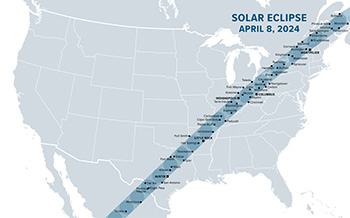Cosmic resilience: Eclipse readiness for your business

A total solar eclipse will cross North America on Monday, April 8. Along the eclipse path, the total event – from partial beginning to partial end – will last about 2.5 hours with the full eclipse lasting 3.5 to 4 minutes. For most businesses in the U.S., the impacts of the eclipse should be a non-issue. However, as businesses along the path learned during the last major eclipse in 2017, disruptions can occur as a result of millions of viewers traveling to watch this rare event.
During the 2017 eclipse, communities experienced fuel and food shortages, substantial congestion on the roads, and some disruption in cell and internet services, as viewers' usage overloaded networks. A transportation analysis conducted in Wyoming after the 2017 eclipse found traffic flow significantly increased. A typical four-hour commute between Casper, Wyo., and Denver, Colo., took 10 (or more) hours and traffic congestion on rural interstates lasted up to 13 hours1.
Bell County, Texas, a prime location for eclipse viewing, is anticipating a doubling of its population from 400,000 to 800,000 during this year’s eclipse. In preparation for this significant increase, county officials are actively planning to manage the impact on their community2. Businesses along the eclipse path, as well as vehicles traveling through the path, should expect some disturbance.
To help mitigate the impact of the eclipse, businesses are encouraged to consider these best practices:
- Ensure a stockpile of raw materials is readily available. Forewarn suppliers about potential congestion and adjust delivery schedules as necessary.
- Ask customers for their flexibility and schedule service and deliveries prior to or following the date of the eclipse.
- Anticipate potential disruptions in cellular and internet services.
- Coordinate with your power company regarding potential grid disruptions. Ensure back-up generators are operational and have adequate fuel. Test your emergency action procedures.
- Communicate to employees about the potential impact to their families, emphasizing the importance of stocking up on food and ensure vehicles are adequately fueled.
- Discuss safe workplace procedures with staff, including the use of proper eyewear when viewing the eclipse.
- During a partial or total solar eclipse, such as the one on April 8th, looking directly at the sun can result in severe eye injury. Viewing should only be done while wearing solar eclipse viewing glasses which meet ISO 12312-2 standards.
- Special procedures should be in place for employees who work outside. Consider a work stoppage and bringing employees inside.
- Educate your drivers of increased hazards:
- Don’t look at eclipse while driving.
- Take notice and caution to cars parked along the roadway.
- Be prepared for vehicles making abrupt stops and turns as they navigate congestion while looking for the ideal place to park.
- Be prepared for pedestrians crossing roads at unexpected places, often while looking up at the eclipse.
- Be prepared for long traffic delays and consider carrying extra food and water while traveling.
- Contact city and county emergency management staff for advice and awareness of plans these organizations will have in place.
- Contact local law enforcement regarding safe means of keeping trespassers off your property (They may be able to conduct extra patrols, etc.). Temporary fencing, signage or security may be appropriate.
If you are a retail business, restaurant, or hotel, how are you preparing for the influx of guests? Do you have:
- Adequate staff on hand? Supplies? Waste disposal?
- Increased security?
- Posting of “guest-only parking” signs?
Some business may choose to “cash-in” on the event by offering paid parking or camping on their property. This brings additional risk to your organization as underage drinking, assaults or other incidents could occur.
Businessowners should check with their insurance agent regarding whether they are covered for these activities and if additional premium may be charged. Most communities require special licensing or permits for these activities and may also require safeguards such as 24-hour security, parking attendants, sanitation services, potable water, etc. to ensure the safety of viewers and employees.
Business Continuity
As you prepare for the eclipse it’s a good time think about other events that can more severely disrupt your business. Events like cybercrime, supply chain disruption, global pandemic, or extreme weather and climate change can permanently close a business if the business is not adequately prepared. Review Nationwide’s Business Continuity Management Interactive Program for tools to assist you in business continuity planning.
Additional resources related to the eclipse
2024 Total Eclipse: What to Expect
Ready Illinois – 2024 Solar Eclipse
[1] Total Solar Eclipse on August 21, 2017. Special Event with Coast-to-Coast Traffic Congestion, Jonathan Upchurch, TR News 317 September-October 2018
[2] Solar eclipse emergency: Texas county braces for fuel shortages, massive crowds, Brian Lada, Accuwether.com, March 4, 2024
